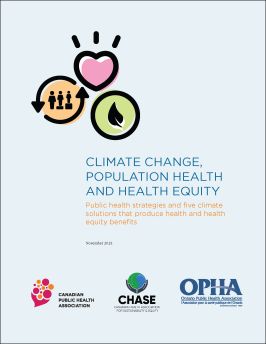Climate change, population health, and health equity: Public health strategies and health and health equity benefits of five local climate solutions
Cette ressource est également disponible en français.
“The impacts of climate change are often born disproportionately by those who have contributed the least to the problem.” (p.10)
The report presents a thorough review of the evidence on how climate change is impacting the health of populations, emphasizing the critical need to cut greenhouse gas emissions by 2030.
Working intersectorally, public health organizations and agencies can effectively influence policies that impact the built environment and support population health and health equity. The report highlights the importance of public health’s role in mitigating the effects of climate change and provides guidance for public health action to support local climate policies and solutions.
Health equity risks of climate change are outlined in the report as well as links between health outcomes and the structural and social determinants of health. Case studies highlight positive action that can be taken by local public health and community organizations and offer examples of climate change solutions that support population health and health equity.
Evidence is provided that demonstrates the benefits of five local climate solutions:
- public transit
- walkable neighbourhoods
- active transportation infrastructure
- green space
- green buildings and building retrofits
These local climate solutions are leveraged through intersectoral collaboration particularly with municipal partners, engagement with populations who are structurally disadvantaged, senior management support, special training, as well as increased and sustained funding for public health.
Click here for further information about the case studies highlighted in this report.
Use this resource to:
- increase awareness about the inequitable population health risks of climate change for people living in Canada
- advocate and build support for climate change mitigation strategies that benefit population health, improve health equity, and create healthier communities
- guide public health organizations and agencies to work intersectorally on local climate solutions
Alignment with NCCDH work:
Understanding public health’s role in addressing the climate crisis and guiding action for health equity aligns strongly with other NCCDH work.
In 2021 the NCCDH developed two practice briefs that highlight the need for accelerated, equity-focused public health action to address the climate crisis.
Climate Change Resilience Part 2: Public health roles and actions
In 2020, NCCDH developed a curated resource list to guide public health action and response to climate change.
Climate change, health equity and public health responses: A curated list
See other resources on climate change and public health.
Reference
Perrotta K. (2023). Climate change, population health and health equity: Public health strategies and five local climate solutions that produce health and health equity benefits. Canadian Public Health Association (CPHA), Canadian Health Association for Sustainability and Equity (CHASE), Ontario Public Health Association (OPHA).
Tags: Intersectoral action, Structural determinants, Climate change, Public Health Organization, Document, Report / Document
